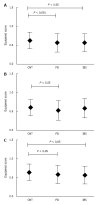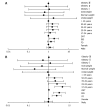Good adherence to mediterranean diet can prevent gastrointestinal symptoms: A survey from Southern Italy
- PMID: 27867690
- PMCID: PMC5095576
- DOI: 10.4292/wjgpt.v7.i4.564
Good adherence to mediterranean diet can prevent gastrointestinal symptoms: A survey from Southern Italy
Abstract
Aim: To evaluate how different levels of adherence to a mediterranean diet (MD) correlate with the onset of functional gastrointestinal disorders.
Methods: As many as 1134 subjects (598 M and 536 F; age range 17-83 years) were prospectively investigated in relation to their dietary habits and the presence of functional gastrointestinal symptoms. Patients with relevant chronic organic disease were excluded from the study. The Mediterranean Diet Quality index for children and adolescents (KIDMED) and the Short Mediterranean Diet Questionnaire were administered. All subjects were grouped into five categories according to their ages: 17-24 years; 25-34; 35-49; 50-64; above 64.
Results: On the basis of the Rome III criteria, our population consisted of 719 (63.4%) individuals who did not meet the criteria for any functional disorder and were classified as controls (CNT), 172 (13.3%) patients meeting criteria for prevalent irritable bowel syndrome (IBS), and 243 (23.3%) meeting criteria for prevalent functional dyspepsia (FD). A significantly lower adherence score in IBS (0.57 ± 0.23, P < 0.001) and FD (0.56 ± 0.24, P < 0.05) was found compared to CNT (0.62 ± 0.21). Females with FD and IBS exhibited significantly lower adherence scores (respectively 0.58 ± 0.24, P < 0.05 and 0.56 ± 0.22, P < 0.05) whereas males were significantly lower only for FD (0.53 ± 0.25, P < 0.05). Age cluster analyses showed a significantly lower score in the 17-24 years and 25-34 year categories for FD (17-24 years: 0.44 ± 0.21, P < 0.001; 25-34 years: 0.48 ± 0.22, P < 0.05) and IBS (17-24 years: 0.45 ± 0.20, P < 0.05; 24-34 years: 0.44 ± 0.21, P < 0.001) compared to CNT (17-24 years: 0.56 ± 0.21; 25-34 years: 0.69 ± 0.20).
Conclusion: Low adherence to MD may trigger functional gastrointestinal symptoms, mainly in younger subjects. Moreover, with increasing age, patients tend to adopt dietary regimens closer to MD.
Keywords: Dietary regimen; Functional dyspepsia; Functional gastro-intestinal disorders; Irritable bowel syndrome; Mediterranean diet.
Conflict of interest statement
Conflict-of-interest statement: There are no conflicts of interest to report.
Figures



References
-
- Azpiroz F, Hernandez C, Guyonnet D, Accarino A, Santos J, Malagelada JR, Guarner F. Effect of a low-flatulogenic diet in patients with flatulence and functional digestive symptoms. Neurogastroenterol Motil. 2014;26:779–785. - PubMed
-
- Vanuytsel T, Tack JF, Boeckxstaens GE. Treatment of abdominal pain in irritable bowel syndrome. J Gastroenterol. 2014;49:1193–1205. - PubMed
LinkOut - more resources
Full Text Sources
Other Literature Sources
Research Materials

